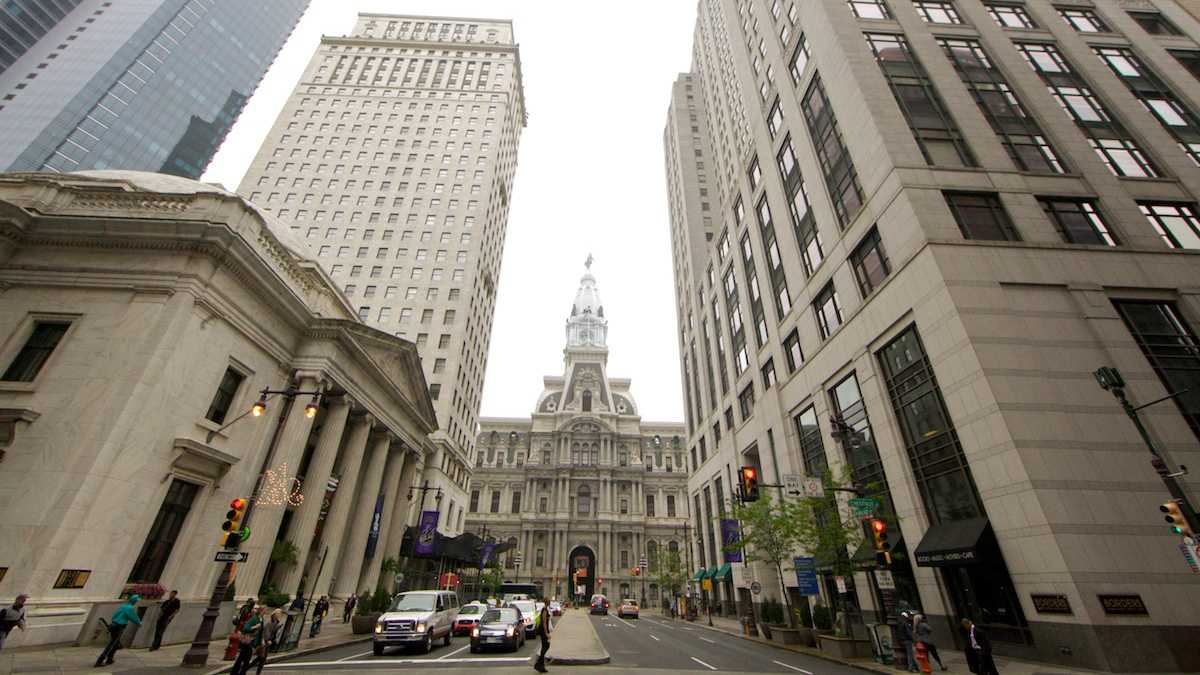How cities are using “reverse auctions” to save money

Philadelphia City Hall. (Nathaniel Hamilton/for NewsWorks)
And why some companies say the auctions could backfire.
Think, for a minute, about everything it takes to keep a city running. You need people of course — the mayor, the budget director, bus drivers, teachers, and so many others.
But you also need things like trucks, snow chains, paper, and pencils. Typically, cities buy these products by asking companies what price they’re asking for.
Each company sends the city a “bid,” a proposal that says what the company charges for a certain item. Maybe a pencil manufacturer says it’ll charge the city 20 cents a pencil. Then city looks the bids over and awards the contract to the lowest “responsible” bidder.
Philadelphia is about to start doing things differently, at least for some of its purchases. In June, it’ll launch “reverse auctions.”
The auctions will take place online, in real time. The city will say it wants to buy a certain number of pencils, for instance. Then companies will take turns offering lower and lower prices for that contract.
The bidding stops when the companies stop bidding.
Philadelphia’s Chief Administrative Officer Rebecca Rhynhart says the city expects to pay between five and 15 percent less for the items that it buys through reverse auctions, compared to what it’s paying now. That estimate comes from looking at the results of a city pilot program in 2014, which saved 4.6 percent on one contract and 5.8 percent on the other, and at results from the federal government’s reverse auctions.
At least for now, Philadelphia is only going to use the auctions to buy products, like trucks and pencils, not services, like construction. “We wouldn’t start out using it for something like a construction project — something that there might be more complicated factors than just the price of an item that’s pretty straightforward like pencils,” Rhynhart said.
Other cities
Several other cities use reverse auctions, including Chicago and Los Angeles.
Since holding its first reverse auction in January 2011, Los Angeles has saved between $15 million and $20 million — the difference between previous contracts and the new prices, according to Kenneth Desowitz, the city’s supply services manager.
LA doesn’t use reverse auctions for all of its contracts. Of the thousands of one-time purchase orders and approximately 170 contracts up for rebidding every year, only about 15 are awarded through reverse auctions. And the city uses the auctions for products only, not services.
Desowitz says reverse auctions can give companies more chances to win a contract. “They’re given multiple opportunities to bid, whereas in a traditional situation they only get one shot at submitting their price,” he said. “If a company really wants to win that business, they’ll go down [in price] as far as it takes.”
“In talking to bidders that have participated in this, the idea that they get multiple chances to win business they really want to win makes it more palatable for them,” he adds.
The response from companies
After Chicago started using reverse auctions in 2010, some companies said they would no longer bid on government contracts, according to Crain’s Chicago Business.
That’s a concern in Pennsylvania, too, says Kevin Shivers, executive state director for the National Federation of Independent Business in Pennsylvania. “As you reduce the number of competitors who seek to bid in this environment, that harms taxpayers in the long run because there are going to be fewer competitors the next time the contract is up,” Shivers said. “And then ultimately prices are going to go up.”
Desowitz says Los Angeles finds out how many companies are interested in a contract before bidding happens, so the city could always choose not to do a reverse auction if this problem crops up.
David Taylor, president of the Pennsylvania Manufacturer’s Association, said he’s not an expert on reverse auctions, but the organization supports efforts to save taxpayer dollars. “We would commend any government entity for trying to find a better value for the taxpayer so that public services can still be provided at a high quality but at a more affordable price,” Taylor said. “Depending on how they’re deployed, reverse auctions can be one way of reaching that goal.”
Correction: A previous version of this story misidentified Philadelphia Chief Administrative Officer Rebecca Rhynhart as the city’s budget director. That was her role during former Mayor Michael Nutter’s administration.
WHYY is your source for fact-based, in-depth journalism and information. As a nonprofit organization, we rely on financial support from readers like you. Please give today.


